Study, work or travel in the UK. British
culture and life.


Guide to the London stage musical "Phantom of the
Opera "
|
|
Study, work or travel in the UK. British
culture and life.
|
|
||
|
|
|
|
||
 |
||||
 |
||||
|
Guide to the London stage musical "Phantom of the
Opera "
|
||||
|
Sections:
|
Introduction | |
| Tickets | ||
| Main characters | ||
| Story outline | ||
| Music | ||
| Vocabulary | ||
| Background notes | ||
| Suitability | ||
| About the author (Gaston Leroux) | ||
| Andrew Lloyd-Webber | ||
| Further information | ||
| Links |
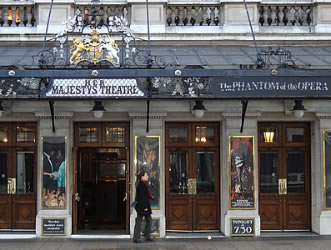 Her Majesty's Theatre |
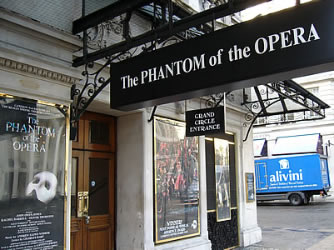 |
 |
The
Complete Phantom of the Opera (book) Author: George Perry Publisher: Pavilion Books Ltd Date: August 1993 |
 |
The
Phantom of the Opera (DVD) [ film version of the musical ] Studio: Entertainment in Video Date: May 2005 |
|
View Her Majesty's Theatre in a larger map |
|
Day
|
Mon
|
Tue
|
Wed
|
Thu
|
Fri
|
Sat
|
Sun
|
|
Matinee
|
-
|
2:30
|
-
|
-
|
-
|
2:30
|
-
|
|
Evening
|
7:30
|
7:30
|
7:30
|
7:30
|
7:30
|
7:30
|
-
|
|
To book a ticket to see Phantom of the Opera click
on this link:
Encore Tickets |
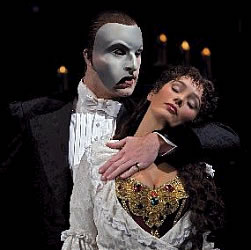 The Phantom and Christine |
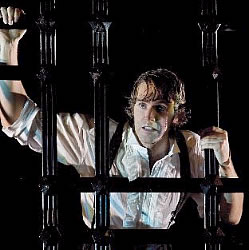 Raoul |
 Musical box (plays the song "masquerade") |
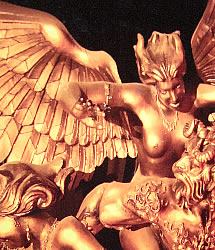 Golden decoration at the opera house |
|
In sleep he sang to me
In dreams he came That voice which calls to me And speaks my name And do I dream again? For now I find The Phantom of the Opera is here Inside my mind |
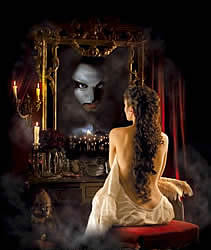 |
 |
|
Masquerade!
Paper faces on parade Masquerade! Hide your face so the world will never find you |
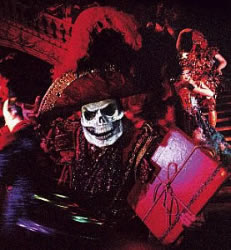 The Phantom appears at the masquerade, holding a copy of his opera |
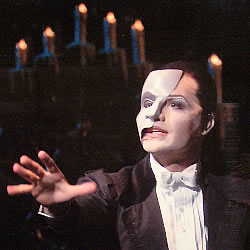 The Phantom |
|
Past the point of no return - no backward glances:
the games we've played till now are at an end ... Past all thought of "if" and "when" - no use resisting: abandon thought, and let the dream descend ... What raging fire shall flood the soul? What rich desire unlocks its door? What sweet seduction lies before us ... ? |
|
Say you'll share with me one love, one lifetime ...
Lead me, save me from my solitude ... Say you want me with you, here beside you ... Anywhere you go let me go too - Christine, that's all I ask of you |
| Disc 1 1. Prologue 2. Overture/Hannibal 3. Think Of Me 4. Angel Of Music 5. Little Lotte/The Mirror (Angel Of Music) 6. The Phantom Of The Opera 7. The Music Of The Night 8. Magical Lasso 9. I Remember/Stranger Than You Dreamt It 10. Notes…/Prima Donna 11. Poor Fool, He Makes Me Laugh 12. Why Have You Brought Me Here/Raoul I’ve Been There 13. All I Ask Of You 14. All I Ask Of You (Reprise) |
Disc 2 1. Masquerade/Why So Silent 2. Madame Giry’s Tale/The Fairground 3. Journey To The Cemetery 4. Wishing You Were Somehow Here Again 5. Wandering Child 6. The Swordfight 7. We Have All Been Blind 8. Don Juan 9. The Point Of No Return/Chandelier Crash 10. Down Once More/Track Down This Murderer 11. Learn To Be Lonely |
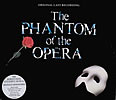 |
The
Phantom of the Opera [Original Recording Remastered] (2 CDs) Label: Polydor Date: July 2000 |
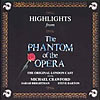 |
Highlights
from The Phantom of the Opera (CD) Label: Polydor Date: June 1999 |
| lot [in an auction] ; barrel organ ; cymbals ; vaults ; chandelier ; phantom ; childhood sweetheart ; private rendition ; diva ; ghost ; to haunt ; chorus girl ; tutor ; to coach someone ; angel ; lasso ; pageboy ; countess ; to play the lead ; prima donna ; toad ; solitude ; to betray ; to curse ; masquerade ; mask ; engagement ; (musical) score ; travelling fair ; ballerina ; architect ; genius ; cemetery ; grave ; companion ; to ensnare ; ordeal by fire ; beyond the point of no return ; abhorrent ; compassion ; to lust for something ; loathing ; fate |
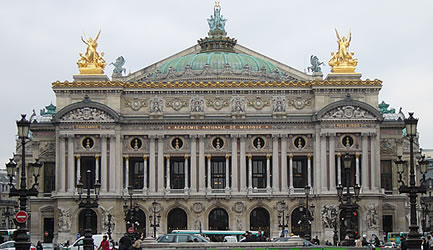 The Paris Opera House |
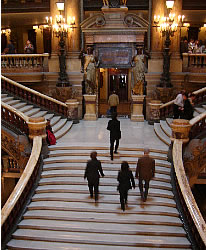 The grand staircase |
 |
The
Phantom of the Opera (Penguin Popular Classics) (book) Author: Gaston Leroux Publisher: Penguin Books Date: May 1995 |
 |
Gold
(2 CDs) Artist: Andrew Lloyd Webber Label: Polydor Date: September 2006 |
|
|
|